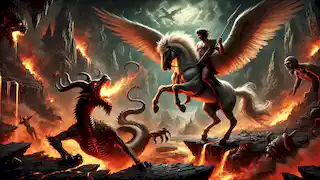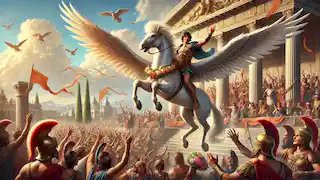(Greece)
{{{_intro}}}
The land of Greece, with its craggy mountains, sapphire seas, and ancient ruins, holds tales of gods and monsters that whisper through the ages. From the songs of Homer to the myths of Hesiod, stories of courage, ambition, and triumph over impossible odds are woven into its history. Among these legends, none is as terrifying or awe-inspiring as the tale of the Chimera. This myth recounts not only the terror of a monstrous beast but also the remarkable courage of Bellerophon and his celestial steed, Pegasus. Long before the age of great city-states like Athens and Sparta, the kingdom of Lycia thrived in the shadow of rugged peaks and deep gorges. Known for its fertile valleys and bustling trade, the kingdom was ruled by King Iobates, a just but aging monarch. Peace had reigned for decades, but this serenity was shattered by the emergence of the Chimera. The Chimera was no mere beast. Born of the union between Typhon—an immortal terror feared even by the gods—and Echidna, the Mother of Monsters, it was a creature of unspeakable horror. With the head of a lion, the body of a goat, and the tail of a venomous serpent, the Chimera combined the most fearsome attributes of nature’s predators. But its most horrifying trait was its fiery breath, capable of reducing villages to ash in moments. The Chimera’s rampage began in the highlands. Shepherds and hunters returned to the villages with tales of a monstrous creature that scorched the earth with each step. Then, it descended into the valleys, its roar shaking the walls of Lycia’s cities. Crops withered, rivers dried, and the people of Lycia lived in constant terror. Far from the turmoil of Lycia, in the city of Corinth, a young man named Bellerophon trained under the guidance of warriors and sages. Tall, strong, and resourceful, Bellerophon was the son of the mortal woman Eurynome and rumored to be sired by Poseidon himself. Though gifted with immense talent, his life was marred by tragedy and misfortune. Bellerophon had been accused of murder—a crime for which he swore his innocence. To escape punishment, he sought refuge in the court of King Proetus of Tiryns. Though the king initially welcomed him, Proetus's wife, Queen Stheneboea, fell in love with the young hero. When Bellerophon rejected her advances, she falsely accused him of attempting to violate her honor. Proetus, torn between his duty as king and his disbelief in his wife’s claims, sought a way to rid himself of the problem without outright killing the guest under his roof. He sent Bellerophon to his father-in-law, King Iobates of Lycia, with a sealed letter. Unknown to Bellerophon, the letter contained instructions for Iobates to kill the bearer. But Iobates, bound by the sacred law of hospitality, could not execute his guest. Instead, he devised a plan: he would send Bellerophon to kill the Chimera, a task he believed was surely suicidal. Bellerophon, unaware of Iobates’s intentions, eagerly accepted the challenge. It was an opportunity to prove his valor and clear his tarnished name. However, as he learned more about the Chimera’s power, even his confidence wavered. He prayed fervently to Athena, the goddess of wisdom and war, for guidance. Athena appeared to him in a dream, her armor glinting with an otherworldly light. “The Chimera cannot be defeated by strength alone,” she said. “Its fire will consume any who face it on the ground. You will need the speed and flight of Pegasus, the winged horse, to prevail.” She handed him a golden bridle and instructed him to seek Pegasus at Mount Helicon, where the horse drank from the sacred spring of Hippocrene. When Bellerophon awoke, he found the bridle beside him, shimmering in the dawn light. Mount Helicon was a place of divine beauty, where the muses sang and nature flourished under their blessings. Bellerophon waited patiently by the Hippocrene spring, keeping watch for Pegasus. Days turned to weeks, and just as despair began to creep into his heart, the majestic creature descended from the heavens. Pegasus was unlike anything Bellerophon had ever seen. Its snow-white wings shimmered like clouds under the sun, and its powerful muscles rippled with each movement. Carefully, Bellerophon approached, holding the golden bridle Athena had gifted him. Whispering softly, he offered words of praise, his movements slow and deliberate. Pegasus, sensing no threat, allowed Bellerophon to place the bridle upon him. As their bond formed, Bellerophon felt a surge of strength and confidence. With Pegasus at his side, he knew he had a chance to defeat the Chimera. The journey to the Chimera’s lair was treacherous. Pegasus carried Bellerophon over jagged mountains and searing chasms, guided by the trail of destruction left by the beast. At last, they arrived at a vast gorge, its depths shrouded in sulfurous smoke. The Chimera emerged from its lair, its three heads snarling and hissing in unison. The lion’s head roared, shaking the ground. The goat’s head emitted a fiery breath that scorched the rocks, while the serpent’s tail lashed out with lethal precision. Pegasus soared high above, keeping them out of the Chimera’s immediate reach. But Bellerophon knew that the creature’s fire could easily reach them if they lingered too long. Remembering Athena’s wisdom, Bellerophon devised a plan. He carried a spear with a lead tip, which he intended to use against the beast. Diving toward the Chimera, he baited its fiery breath, maneuvering Pegasus with unparalleled skill. As the Chimera inhaled to unleash another stream of fire, Bellerophon hurled the spear into its open mouth. The lead melted within the beast’s throat, choking it with molten metal. With a deafening roar, the Chimera collapsed, its massive body lifeless. The flames of terror that had plagued Lycia were extinguished. When Bellerophon returned to King Iobates, riding upon Pegasus and carrying the proof of his victory, the people of Lycia erupted in celebration. King Iobates, astonished by the young man’s success, realized that Bellerophon was favored by the gods. He confessed the true nature of his task and, in a gesture of atonement, offered Bellerophon his daughter’s hand in marriage and half the kingdom. Bellerophon’s fame spread far and wide. He was hailed as a hero not only for his bravery but also for his ingenuity in defeating an unbeatable foe. Pegasus, too, was celebrated and became a symbol of divine inspiration and freedom. But like many heroes of Greek legend, Bellerophon’s story did not end in glory. His success against the Chimera and the adoration of the people sowed seeds of pride. Believing himself invincible, he sought to ascend to Mount Olympus, the home of the gods, riding upon Pegasus. The gods, displeased by his hubris, sent a gadfly to sting Pegasus. The winged horse bucked, throwing Bellerophon from the heavens. He fell to the earth, crippled but alive. For the rest of his days, he wandered alone, a broken man who had reached too far. Pegasus, however, ascended to Olympus, where it was welcomed by the gods and immortalized as a constellation in the night sky. The Chimera’s tale became a symbol of both terror and triumph. Its defeat by Bellerophon and Pegasus was celebrated in art and poetry, reminding mortals of the balance between courage and humility. The story served as a warning against hubris and a celebration of ingenuity and divine favor. Even today, the constellation Pegasus shines brightly, a reminder of the hero and his divine steed. The Chimera, though defeated, remains an enduring symbol of challenges that seem insurmountable but can be overcome with determination, ingenuity, and a touch of divine grace.Part One: The Monster in the Mountains
Part Two: The Hero and the Quest

Part Three: Divine Intervention
Part Four: Pegasus, the Winged Wonder

Part Five: Confronting the Chimera
Part Six: A Hero’s Triumph

Part Seven: The Fall of Hubris
Part Eight: Legacy of the Chimera




















